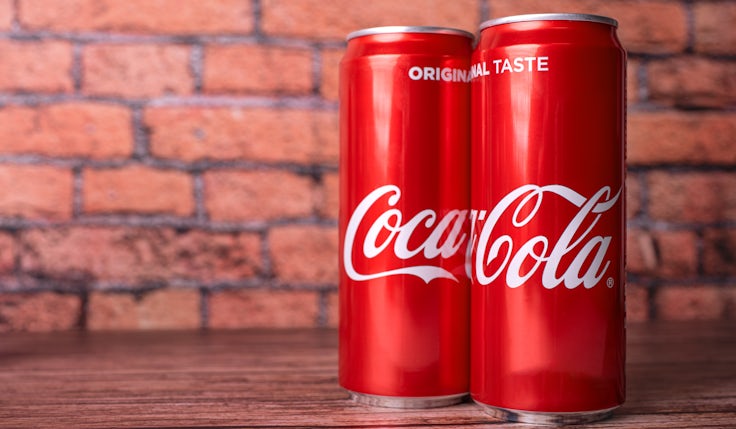Retail sales, inflation, marketing budgets: 5 interesting stats to start your week
We arm you with all the numbers you need to tackle the week ahead.
Retail sales volumes fall at steepest level since early 2021
Retail sales volumes fell by 3.2% in December 2023, marking the largest monthly fall since January 2021, when the pandemic severely restricted sales.
The fall of 3.2% last month follows a rise of 1.4% in November 2023.
Non-food sales fell more steeply than food sales in December, at 3.9%. Non-food sales rose by 2.7% in November.
Shoppers may have been choosing to do their Christmas purchases earlier, with more Black Friday offers and wider discounting in November, according to the Office for National Statistics (ONS).
Food sales volumes also fell last month, by 3.1%, versus an increase of 1.1% in November.
While the final three months of the year are often referred to as ‘the Golden Quarter’ by retailers, buoyed by big events like Christmas and New Year sales. However, sales volumes fell by 0.9% in the three months to December 2023, versus the three months prior.
Source: Office for National Statistics
UK inflation rises unexpectedly
 The UK rate of inflation rose unexpectedly in the 12 months to December, marking the first time it has increased in 10 months.
The UK rate of inflation rose unexpectedly in the 12 months to December, marking the first time it has increased in 10 months.
The Consumer Price Index (CPI) rose by 4% in the 12 months to December. In the year to November, it rose by 3.9%. This is the first time the annual rate of inflation has risen since February 2023.
This came as a surprise to many economists. Those surveyed by Reuters had forecast that the annual rate of inflation would fall to 3.8% in December.
The largest upward contributors to the CPI rate were alcohol and tobacco prices, while the largest downward contributors were food and non-alcoholic beverages.
Source: Office for National Statistics
Marketing budgets get a boost despite economic uncertainty
 Many businesses rallied at the end of the year to increase their marketing budgets despite the uncertain economic environment.
Many businesses rallied at the end of the year to increase their marketing budgets despite the uncertain economic environment.
The latest IPA Bellwether report finds the majority of businesses opted to step up their investment in marketing in the fourth quarter. Some 26% of businesses report an upward revision of spend in the fourth quarter. By contrast, only around one in 10 (11.3%) saw budgets decrease in the final three months of the year.
This means a net balance of 14.7% of businesses made upward revisions to marketing spend in the fourth quarter of 2023. This net balance total is the highest recorded by the Bellwether report since the second quarter of 2014.
The report does not record to what extent businesses revised marketing spend, or account for adjustments made with inflation.
Bellwether co-authors S&P Global present a rather lacklustre forecast for the year ahead, forecasting that the UK has begun the year in a “shallow recession”. Forecasts for gross domestic product (GDP) across the year remain unchanged and are expected to decline by 0.1% across 2024.
Source: IPA Bellwether
Around one in three online reviews are fake
 Around a third of online reviews are fake, according to a report from fake reviews protection site TruthEngine, with the number set to rise. The report predicts that by the end of next year, 50% of reviews will be fake.
Around a third of online reviews are fake, according to a report from fake reviews protection site TruthEngine, with the number set to rise. The report predicts that by the end of next year, 50% of reviews will be fake.
Despite the distinct possibility that online reviews could be fabricated, most consumers still put trust in them. One in four (25%) consumers place a “high value” on these reviews in their purchase decision, while a further three-fifths place “some value” on these when making choices about what to buy.
That means that over four in five (85%) place trust in reviews to influence their purchase decisions to some extent.
Bad reviews are also the single most likely issue to put a consumer off making a purchase. Almost half (48%) of consumers say they would be put off buying a product with bad reviews.
Source: It Works Media and TruthEngine
Employees in advertising most likely to admit using ChatGPT
 Advertising is ranked as the industry most likely to use ChatGPT, with the highest number of employees admitting to using it.
Advertising is ranked as the industry most likely to use ChatGPT, with the highest number of employees admitting to using it.
Almost two-fifths (39%) of those working in advertising admit to using the AI tool in their work. In second place is professionals working in the legal industry, with 38% of people stating they’ve used ChatGPT. Around a third (33%) of those working in arts and media admit to using the tool.
The most common reason for using ChatGPT is report writing, with over a quarter (27%) stating they use it for this purpose. Doing translations (25%) and deploying it for research purposes (17%) are the second and third most popular use cases.
While ChatGPT is popular among different industries, over half (55%) of business workers claim they do not trust working with another business who uses ChatGPT or similar AI tool in their workplace.
Source: Indusface








